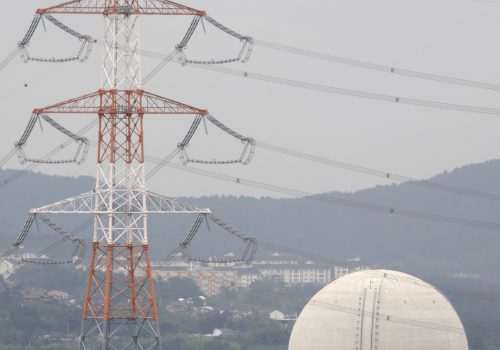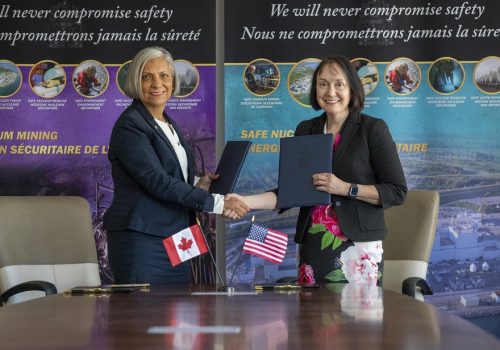As the global community continues to grapple with the coronavirus (COVID-19), the Atlantic Council is open for business. Our business, meetings, and events, however, are occurring virtually. For more information, please read an update from our President and CEO.
Event recap
On March 3, 2021, the Atlantic Council Global Energy Center hosted a virtual discussion on how the United States and Republic of Korea (ROK) can cooperate on nuclear energy to strengthen the nuclear industries of both countries. Ambassador Thomas Graham, Jr., co-chairman of the Atlantic Council Nuclear Energy and National Security Coalition and executive chairman of the board for Lightbridge Corporation, delivered opening remarks. An ensuing panel conversation featured Stephen Greene, nonresident senior fellow at the Global Energy Center and author of the report; John Hopkins, chairman and chief executive officer at NuScale Power; Hong-Kyu Kang, general manager of marketing and sales at Doosan Heavy Industries and Construction; and Jae-Soo Ryu, director of international relations at the Korea Atomic Energy Research Institute. Dr. Jennifer Gordon, managing editor and senior fellow at the Global Energy Center, moderated the discussion.
Ambassador Thomas Graham, Jr. began by reflecting on his diplomatic work in service of nonproliferation and the peaceful use of nuclear energy. An advocate for the Non-Proliferation Treaty’s robust safeguards and guarantee of signatories’ civil nuclear pursuits, Graham lauded nuclear power as “the only energy source on the scene that can provide a clean, reliable baseload” to support decarbonization. The United States and its allies must lead the industry, he continued, in order to advance cutting-edge technology while setting vigorous international safety and transparency standards. In those efforts, Graham affirmed, South Korea remains an “indispensable civil nuclear partner.”
Stephen Greene began the panel discussion with an overview of the US nuclear industry’s present state. While noting the industry provides the majority of the United States’ zero-emission power supply, Greene considered it “challenged” by political and price competition from other renewable and nonrenewable energy sources. Nevertheless, Greene observed, current operations have persisted, and new technologies with high safety standards give cause for optimism about the nuclear industry’s future.
Hong-Kyu Kang followed by surveying the industry in South Korea. The ROK, he noted, began a nuclear phase-out after Fukushima, prioritizing wind and solar as clean energy alternatives. Although suspending nuclear development and licensing put builders and suppliers in dire straits, Doosan survived South Korea’s nuclear doldrums by developing small modular reactors (SMRs) and expanding its services abroad.
John Hopkins contributed a US private sector perspective. While the industry was moribund a half-decade ago, he recalled, “circumstances have changed dramatically.” Environmental concerns have transformed public opinion, with a “groundswell around the world” initiating increased government funding and public-private partnerships to develop the next generation of advanced reactors and level the competitive playing field. The sector now is at a “tipping point,” Hopkins concluded, and noted that it is “a good time to be in the advanced nuclear industry.”
Jae-Soo Ryu concluded the panel discussion by assessing the current state of US-ROK civil nuclear cooperation. Even after Fukushima, there remains an abundance of research and development collaboration between Seoul and Washington, particularly in the form of joint projects on spent fuel processing, uranium enrichment, and the Prototype Gen-IV Sodium-cooled Fast Reactor (PGSFR). Meanwhile, the two countries have also worked to build nuclear supply chains, promote export control, and bolster physical safety in line with their countries’ twenty-five bilateral 123 agreements.
A Q&A segment focused on industry cooperation, technological innovation, and growing transpacific public support. Speakers emphasized US-ROK research collaboration, with Kang highlighting the “strong synergy” between Doosan and NuScale as they advance a strategic partnership in the United States and beyond. Kang and Greene argued that such cooperation is critical to maintaining strong nuclear safety and nonproliferation standards and pushing back against Russo-Chinese dominance of the global nuclear industry. The advantage of the US-ROK partnership lies in its technology, especially as the two collaborate to build safer and more efficient SMRs. Panelists from both the United States and ROK agreed that accelerating demand for clean energy was spurring a sea change in public opinion toward nuclear energy. Looking ahead, speakers noted that maintaining that support, in addition to securing financing and driving cost efficiency, served as some of the industry’s biggest lingering challenges.
Paddy Ryan is a Spring 2021 Intern at the Atlantic Council Global Energy Center.
Agenda
Opening remarks by
Amb. Thomas Graham, Jr.
Co-Chairman, Nuclear Energy and National Security Coalition
Atlantic Council;
Executive Chairman of the Board
Lightbridge Corporation
A conversation with
Stephen Greene
Nonresident Senior Fellow, Global Energy Center
Atlantic Council
John Hopkins
Chairman and CEO
NuScale Power
Hong-Kyu Kang
General Manager of Nuclear Marketing and Sales
Doosan Heavy Industries and Construction
Jae-Soo Ryu
Director of International Relations
Korea Atomic Energy Research Institute
Moderated by
Dr. Jennifer Gordon
Managing Editor and Senior Fellow, Global Energy Center
Atlantic Council
Related content

The Global Energy Center develops and promotes pragmatic and nonpartisan policy solutions designed to advance global energy security, enhance economic opportunity, and accelerate pathways to net-zero emissions.


